
School of Nursing and Midwifery Public Seminar Series

The School of Nursing and Midwifery held its first Public Seminar Series of the 2017/2018 Academic Year at the R.S. Amegashie Auditorium at the University of Ghana Business School. In attendance were nurses from Pantang hospital, Teshie Nursing and Midwifery School, University and Police Hospitals as well as Wisconsin International University College. Other individuals present included the Acting Dean of the School of Pharmacy, Dr. Julius Asiedu-Gyekye and the Director of Noguchi Memorial Institute for Medical Research, Professor Kwabena Mante Bosompem.
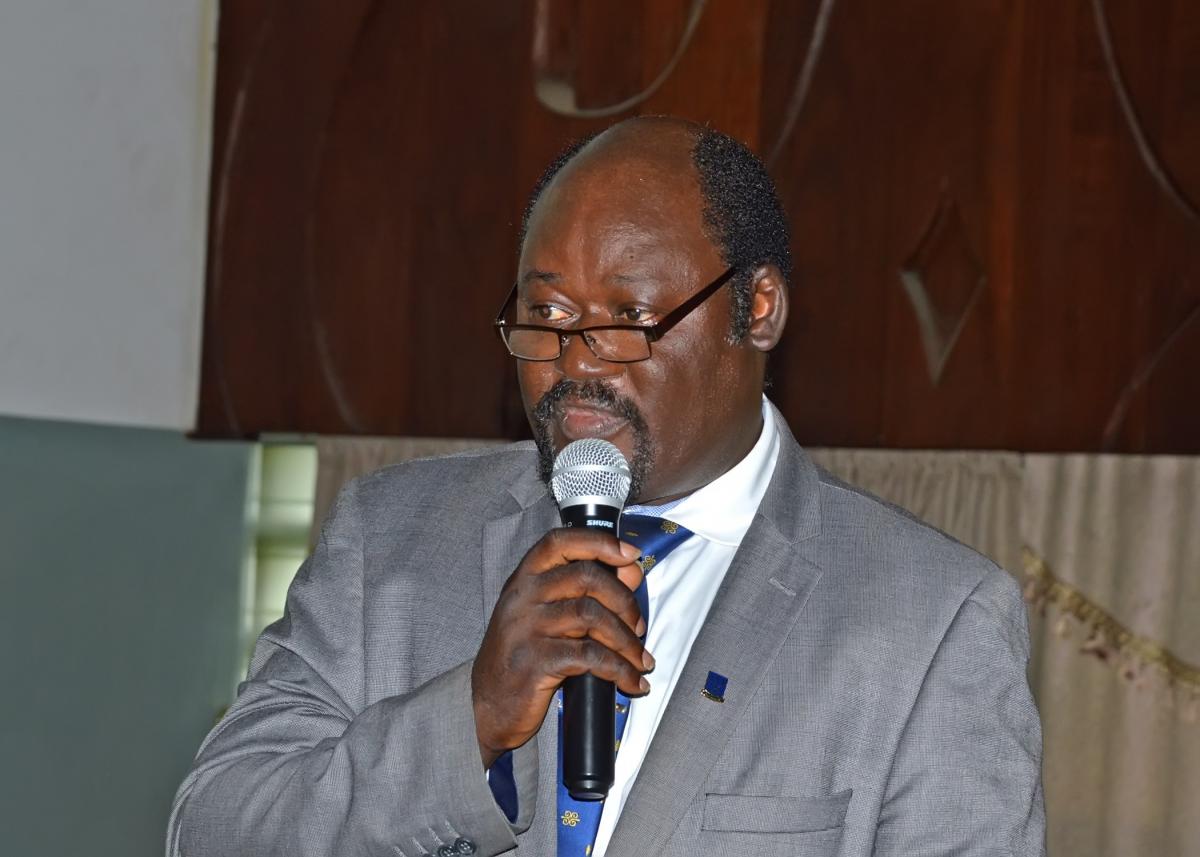
Professor. Kwabena Mante Bosompem - Director of Noguchi Memorial Institute
The Provost of the College of Health Sciences, Rev. Prof. P.F. Ayeh-Kumi, was the Chairman for the occasion. In his opening remarks, he referred to the 3rd Biennial College lecture held a couple of weeks ago on Suicide. Pain, he said can sometimes cause people to have suicidal thoughts. Pain in whatever form is a very important phenomenon for healthcare professionals. Going through pain regularly is not easy to handle and we should therefore show appreciation to our mothers and women who go through pain to give birth to us. He continued that, the College had the opportunity to speak on infertility on another platform a few days back. In the African cultural setting, having a child or two is considered inadequate neither is it acceptable to have children all of same sex. Therefore not being able to have children is stressful for many. In Ghana, the first IVF baby was born 14 years ago and this led to the establishment of a Centre to handle infertility issues in Ghana. Infertility he said does not affect only women but affects every spectrum of society.
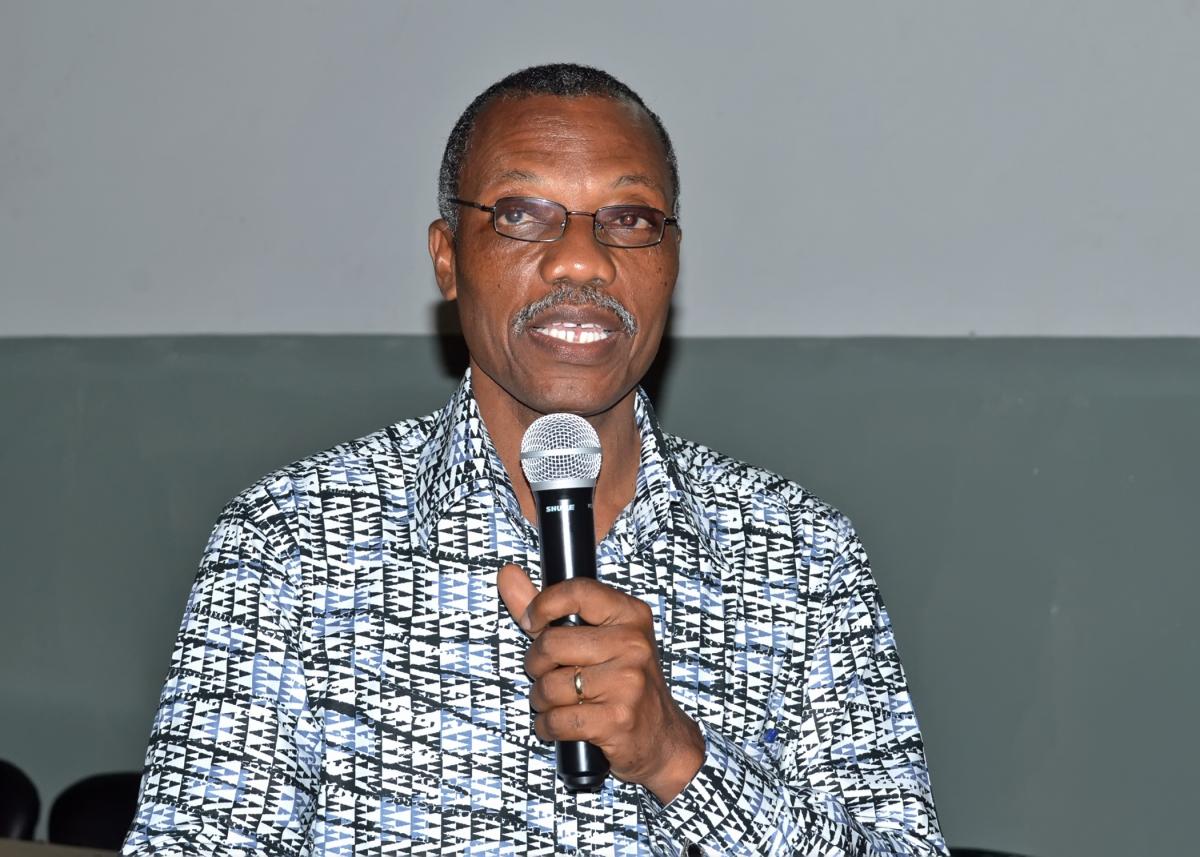
Prof. Ayeh-Kumi - Provost of the College of Health Sciences
The first presentation was by Dr. Lydia Aziato, the Acting Dean of the school. She pointed out that women go through certain kinds of pain that men do not experience due to the fact that men have different biological make up. The first type of pain she discussed was menstrual pain which some woman of child bearing age go through every month. Menstrual pain she said subsides or stops completely with some women at a certain age or after child birth but for others it does not.
She said in Ghana, pain management information on women is very low. She stated that only few women who can afford the cost of epidural analgesia during child birth request for it. Otherwise, majority of women during child birth go through pain. In general labour pain is managed very poorly. She opined that some women believe that pain during child birth was instituted by God and hence women want to endure pain during labour so they can pride themselves as women.
The question however, remains, what are the causes of pain. For majority of authors the cause is not known but there are others who proposed that the effect of high prostaglandin and oxytocin for instance might be the cause. However, this has not been established within the Ghanaian populace yet. Other reasons that have been given for menstrual pain include endometriosis, fibroids and infection. The effects of pain she said include anxiety, tiredness, depression and high blood pressure.
In her qualitative research, Dr. Aziato said she collected her data from a tertiary institution and a regional hospital in Accra for both menstrual and labour pain. Pain she pointed out is a subjective phenomenon and the onset and duration of pain as well as the intensity differs among individuals going through pain. She advised the audience to be sensitive to others in pain since it is culturally unacceptable in Ghana to ask if someone is menstruating. Some of the effects of menstrual pain include some women wanting to get pregnant to put a stop to the pain believing that once they give birth the pain will cease, others have had to take out their uterus completely in order to stop the pain. Pain killers are used extensively in the management of the pain. It is important to understand that some people are ignorant of the causes of the pain. For instance, someone thought she had a crab in her abdomen that kept on pinching her and wanted to use a knife to pierce her abdomen in order to kill the crab.
On the attitude of health personnel on the handling of patients who are brought in due to menstrual pain, she appealed to health personnel not to leave these ladies/women to suffer. Due to the negative attitude of health professionals, some of the ladies/women suffer in silence. Those with menstrual pain also display other symptoms like vomiting and diarrhoea. Some effective ways of curbing the pain she advised are the use of warm water/hot water bottle and drinking a lot of water. She also appealed to women to plan ahead of the menstrual period by making sure their medication was at hand and exercise regularly.
On labour pain, she said there are also socio-cultural issues where women who are not able to contain their pain are teased and their husbands insulted. To manage labour pain, she said sacral massages, breathing exercises and psychological care are helpful in managing the pain. Epidural analgesia is not a routine service in Ghana and is only provided if you can afford it. She also called for a pharmacological approach to pain management.
In conclusion, she recommended the following:
i. A need to prepare the minds of pregnant women and offer them support during labour
ii. School clinics should have analgesics as part of their medical stock
iii. Organize exercise groups in our neighbourhoods and churches
iv. A need in the change of attitudes towards pain since pain can cause other things such as high blood pressure, short supply of oxygen
v. A national policy to cover remedial classes for those who miss classes during severe menstrual pain
vi. NHIS to cover the cost of epidural analgesia during labour
vii. Have a multi-disciplinary approach towards pain management.

Dr. Lydia Aziato - Dean of the School of Nursing and Midwifery
Dr. Florence Naab was the second presenter. Her presentation was a compilation of 3 articles put together as one in this presentation. Her topic was ‘Understanding the complexities of infertility in Ghana’. There are multiple factors associated with infertility. Infertility is a journey for every couple. Couples seem to be happy until others start interfering in their marriage by asking questions such “When are we coming for the outdooring”? Such questions she indicates upset the couple’s psychological health. It affects their emotional well-being leading to thinking and nagging which sometimes eventually end in divorce. She provided quotes from some of the participants both men and women who are suffering from infertility.
Using the WHO definition, she defined infertility as the inability of a couple, not a woman, to achieve a pregnancy within a period of 12 months after regular unprotected intercourse i.e. 3-4 times per week. Dr. Naab indicated that there are two types of infertility i.e. primary and secondary. Globally, she said 10% of couples do experience some amount of infertility out of which 30% can be found in sub-Saharan Africa which makes it the leading continent in infertility rates. Infertility she pointed out is a major source of stress for women in Africa which leads to divorce. It is seen as a major crisis. It causes psychological health problems such as isolation, stigma, stress, anxiety and depression. In the African context, it is believed that infertility is caused by witchcraft, evil persons, as punishment from ancestors and from a “slap with a ring”. The consequences of Africans beliefs are marital instability, abandonment of women, stigma and divorce.
In her study on infertility, Dr. Naab used the Common Sense Model of Illness representation for her study. In this model coping strategies are determined by your personal beliefs and what you belief about the problem, if the problem is acute or chronic and if there is any treatment at all available. This model helped her to measure, categorize beliefs and examine their relationships. She recruited participants from 2 public hospitals. From her study she found that some women had high levels of stress but low levels of anxiety, some had some level of social isolation and stigma but depression was very high. Because there was little that they could personally do about the situation high levels of depression and stigma were predicted.
Dr. Naab has developed a culturally sensitive manual for psychosocial counselling which takes 12 weeks to complete. The manual is based on the 7 principles of African beliefs. Surprisingly, some people did not know what infertility is. The hospitals in Ghana offer only clinical treatment for infertility but no psychosocial treatment and hence she recruited the participants from hospitals to test how Ghanaians would accept the treatment. In her conclusion, she said that infertility is a bio-psychosocial problem and needs all stakeholders to help solve the problem.
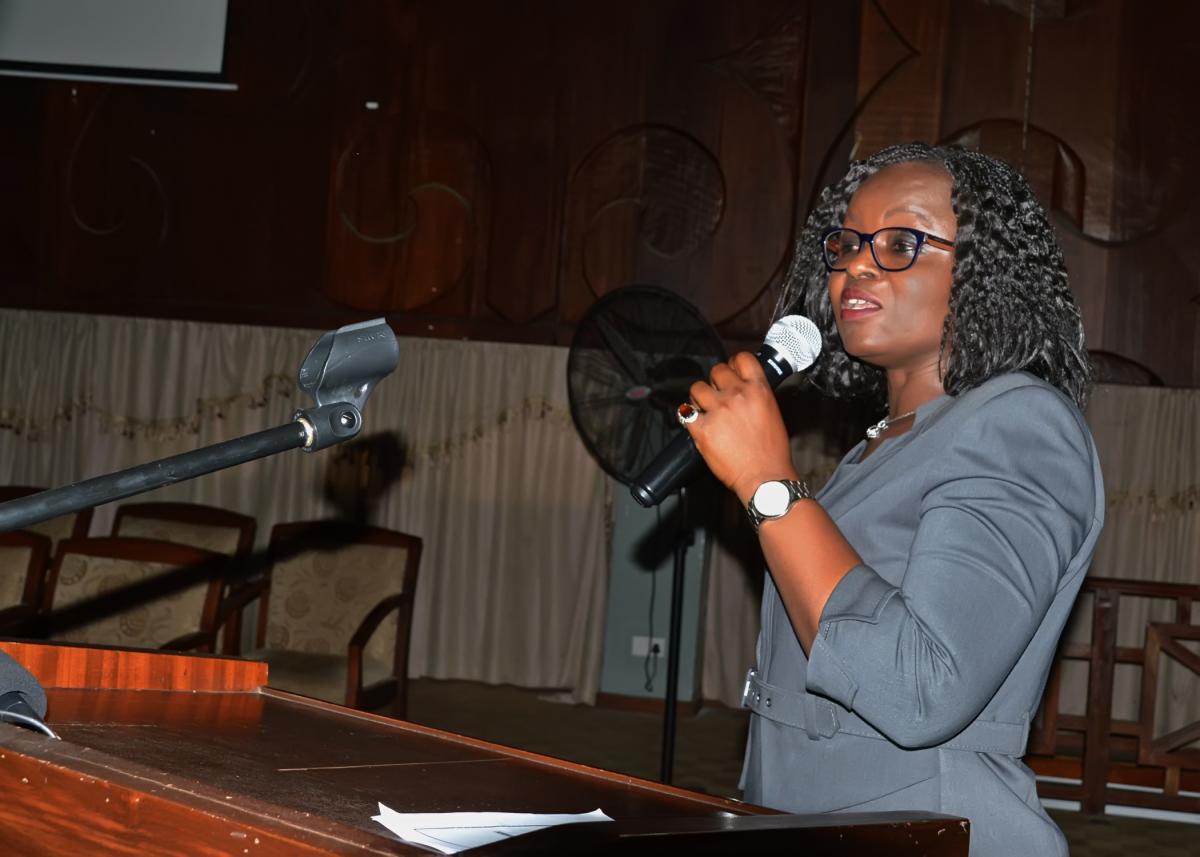
Dr. Florence Naab
After the two presentations, there was time for questions, comments and contributions.
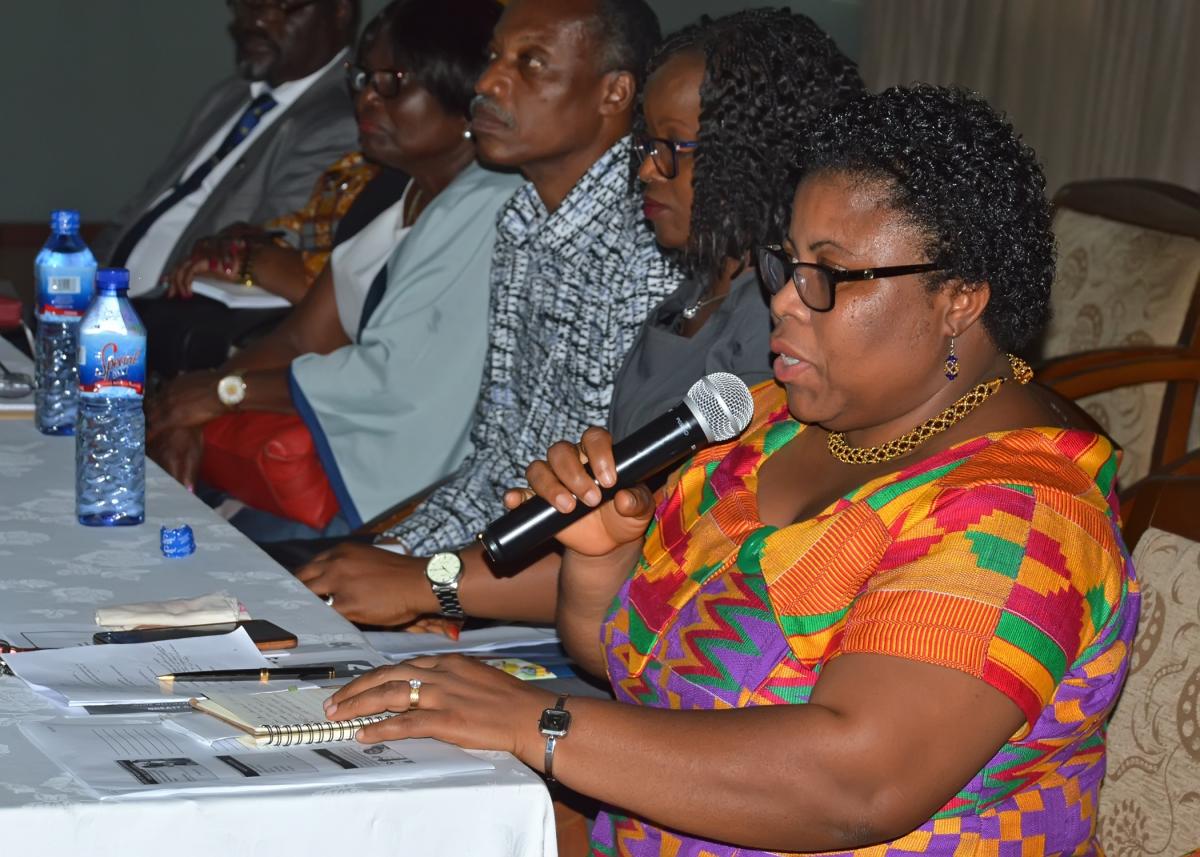
The hightable during the question and answer session
A Section of the Audience
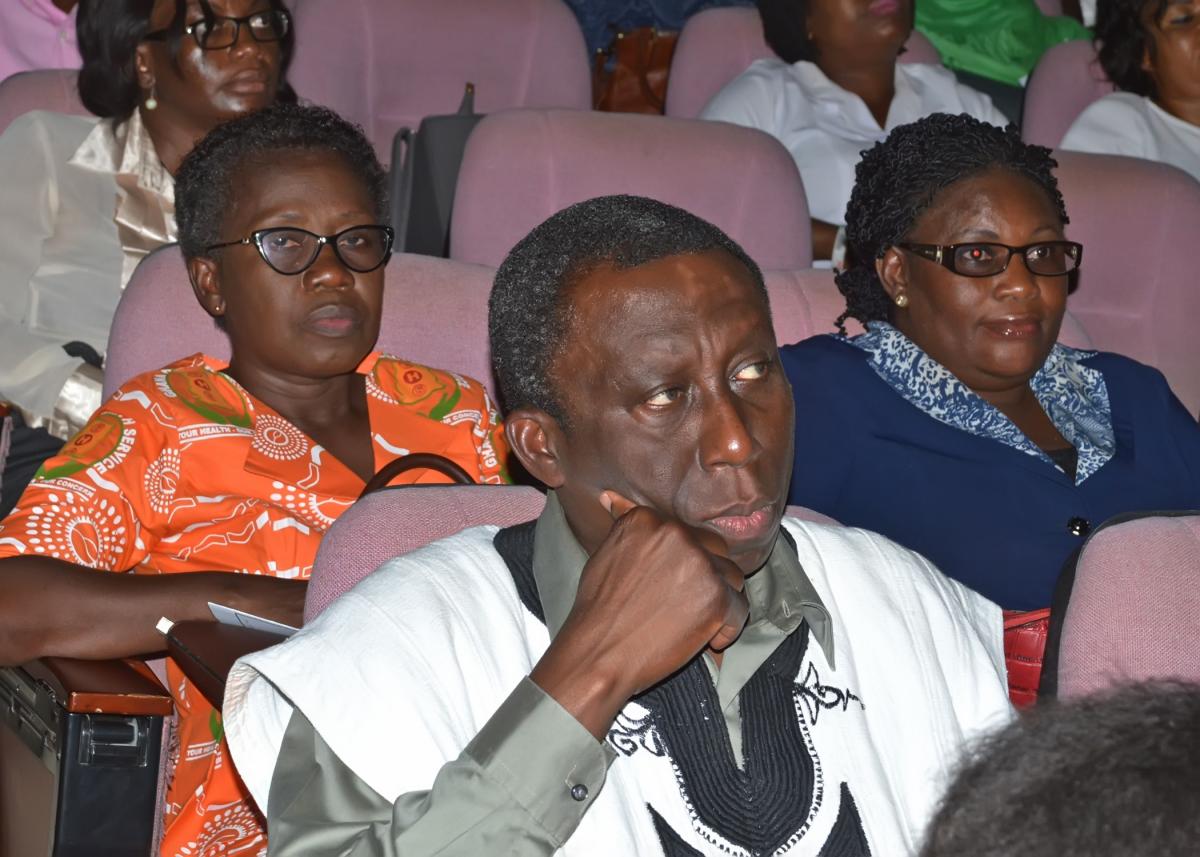
Professor Francis Dodoo in the audience listening to the lectures